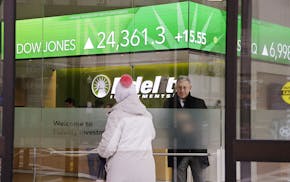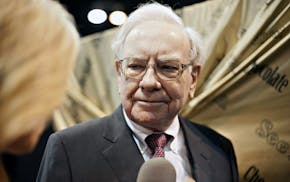We are all probably a little poorer than we were a few weeks ago. And it feels bad.
But if we have been planning, we are safe. We haven't turned a 20-year time horizon into a 20-hour one. So while the numbers on our investment accounts are real, they are no more disturbing than we allow them to be.
Think of volatility as a tax that we all pay for investing, and it's collected only during bad markets.
This particular tax serves us well because it is what creates the long-term returns that will enable us to spend the money we want to spend when we want to spend it. But right now, it feels lousy to pay it.
The last few years of strong markets not only made us forget the tax, it also may have corrupted our definitions of risk. You may have construed risk as the last incremental bit of return you didn't grab instead of a coordinated effort to try to gain consistent returns over time.
Margin of safety or cash in the bank? Ha. That was for weenies, until it wasn't.
This is a great investment teaching moment. These are the times when fortunes are gained and lost. The irony is that if either of these happen to you, you screwed up.
Yes, if you make a fortune in this environment you may have gotten lucky because you did something that is not repeatable. Markets are affected by the simultaneous decisions of millions of people, none of whom is completely rational.
Therefore, while the best algorithms may tell you what a stock is intrinsically worth, they don't tell you a thing about how the legions of investors buying and selling that stock value it. But this is a time to get into the game, not to give up the game. Just know your game.
Most of our clients are hoping to be financially independent. This means that they hope to end up with options regarding how they spend their time and money. The easiest route to financial independence is through time and compound interest (your earnings earning earnings).
You need to consistently put money away over a long enough period of time so the volatility tax works in your favor. But that is not the only way.
In his book, "The Psychology of Money: Timeless Lessons on Wealth, Greed, and Happiness," Morgan Housel writes, "Modern capitalism is a pro at two things: generating wealth and generating envy."
The funny thing about financial independence is that the less envy you have the less wealth you need. Financial independence is a spending issue disguised as a saving issue.
When you are ready to live off of your assets, pensions and Social Security, you are trying to replace what you spend. If you spend only half your income, why would you need to replace your entire income? If you spend 95% of what you make, then that's what you will need to replace.
So your first step to financial independence is to spend less. The easiest way to spend less is to want less. Regardless of your religious views, that 10th commandment, about not coveting, may be the greatest piece of financial advice ever conceived.
People who are overspending are generally doing so because they feel like they "deserve" to be able to have something or do something. But egos create this mentality. Drop this thinking and watch your savings grow.
Housel writes, "Saving money is the gap between your ego and your income, and wealth is what you don't see."
That neighbor's expensive trip to Europe decreased their wealth, it didn't declare it. You don't know if they maxed their credit cards, took out a home equity loan, raided their retirement account, or spent cash. The only thing you know is that they have less money than they had before.
If that is how you want to use your money, then by all means go for it. The trap is when you start asking why somebody else has so much more than you do. Wealth is what you don't see. Once you see it, it's gone.
Use these times to focus on what you really want, understand why it is important to you, and then determine what you are willing to give up to get it. Take the guesswork out of investing and stick with your investment program through these challenging markets.
While we are poorer than we were a few weeks ago, the markets are cheaper. In the next few months, they may get cheaper still, but bring on that tax, because we have the time to pay it.
Ross Levin is the chief executive and founder of Accredited Investors Wealth Management in Edina.

Ramstad: Minnesota's big businesses are in crisis with a common problem

'Brady Bunch'-style split-level homes enjoying a revival in Minnesota — with a twist

Now is the time to invest in bonds, with yields too good to ignore

Don't consider just your conflicts of interest. Be wary of your advisors', too
